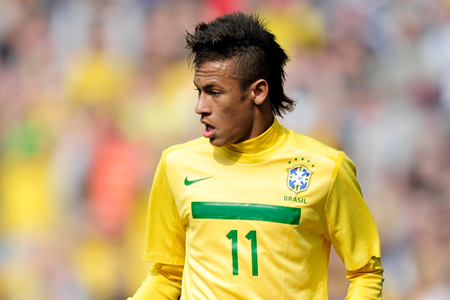
Soccer star Neymar, the most marketable athlete in the world, has just transferred to European powerhouse Barcelona. The 21 year-old has left Brazilian based club Santos in a reported €57m deal. Though the move is not so clear cut.
A common practice for soccer players in Brazil is the selling of their economic rights. This is where an individual or company will purchase a percentage of a players transfer rights; an investment in the player with the hope that his value will increase, and thus the investing party will see a return. Youth players are normally at the center of the deals, with the investor purchasing the rights from the club they are currently employed at. The practice has come under scrutiny by many factions within the soccer world, including the Premier League and soccer’s governing body, FIFA.
The case with Neymar is complex, with many different investors owning a portion of the player. His club Santos owned 55%, DIS Esporte owned 40%, and TEISA owned the remaining 5%. The breakdown of the €57m looks straightforward. However, Barcelona paid an upfront fee of €10m last year, directly to Santos. On top of this, a €30m fee was paid to the player himself. This leaves €17m to be distributed among investors. Under this model DIS Esporte received €9.6m. The investment company is claiming they are entitled to 40% of the full €57 million, which is the total amount paid in transfer fees for the player.
This is not the first time third party ownership has been shrouded in controversy. In 2006, West Ham United purchased Carlos Tevez and Javier Mascherano, whose rights were owned by several companies represented by agent Kia Joorabchian. It was later found that West Ham had failed to report on these third party agreements and was fined £5.5 million.
As previous mentioned, the Premier League is trying to eradicate the process of third party ownership within the league. Under their current rules, no party can act in two capacities when a player is transferred. For example, an agent can’t own a portion of the player and represent them in the transfer process, as was the case in the West Ham saga.
The argument in favor of this method of ownership is that a club can hedge the risk of a player’s future transfer fee, limiting their exposure should their value decrease. It is also seen as a tool for less financially sound clubs to raise capital. When a young player inexplicably leaves to play for a bigger club, the team that developed them will at least receive some compensation they are entitled to.
DIS Esporte has yet launch legal action, though is planning to in a bid to find out where the money has been distributed. Confidentiality currently precludes them from finding out this information.
Neymar is currently represented by Wagner Ribeiro. He also is managed by 9ine and the newly formed Doyen Group for commercial activities.

One reply on “Neymar’s Transfer Highlights Cloudy World Of Third Party Ownership”
Really very nice information. thanks for sharing and try keep updating.